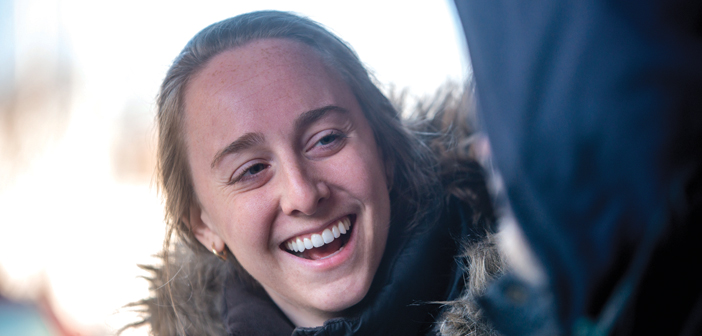Students guide homeless Rhode Islanders through the health care system.
Walk through Providence on a winter night and you can find people sleeping on doorsteps, in bus shelters, any nooks that provide some refuge from the cold. The Rhode Island Coalition for the Homeless reports that in a given year more than 4,000 people in the state experience homelessness.
“It’s easy to just turn the other way,” Meredith Adamo MD’18 says. But she and 20 other Alpert medical students are doing the opposite. In 2014 Adamo cofounded the Rhode Island Medical Navigator Partnership (RIMNP), which pairs teams of medical, nursing, and social work students with a chronically homeless individual who is experiencing health problems. The group has worked with 13 clients so far. RIMNP grew out of Adamo’s experience doing street outreach with Craig Kaufmann, MD RES’06, clinical assistant professor of psychiatry and human behavior, and Megan Smith ’10, a case manager from House of Hope Rhode Island. “We were all moved by the experience, but we also thought that there was more that we could do,” Adamo says.
“There are medical illnesses that people have that have caused them to become homeless,” Alicia Lu MD’18, a RIMNP cofounder, says, “and then there are also medical conditions that result from being homeless, and they often exacerbate each other.”

Frequent emergency room visits are the norm among chronically homeless people. Adamo says her client goes to the ED about once every six weeks. “However, we also have clients that go [to the ED]multiple times a week,” she says. Navigators visit clients during hospital stays and have called 911 for them in emergency medical situations. But chronic illnesses such as hypertension and diabetes can become extremely dangerous when not properly managed. “A lot of these folks don’t have primary care,” Adamo says. “That’s usually one of the first things that as navigators we help with, because the emergency room can only do so much.” House of Hope case managers help clients get medical insurance and housing.
Students accompany clients to doctors’ appointments, where, Adamo says, she can be “a constant presence not only for [my client]but for his team [at the hospital], who switch every shift. Providing a second voice, especially when he’s feeling very sick, and making sure that the team knows the right thing is much of the reason we are there.”
“In our normal medical school curriculum, all the students are required to follow a doctor who is a mentor,” Lu says. “But this program allows us to follow a patient, which is a very different perspective.”
Adamo says that finding solutions for clients is rewarding, but getting to know them individually is even more so. “My client used to be a radio DJ, and when you get him talking about music and his days on the radio it’s like another person comes out,” she says.
Lu and Adamo are working on a narrative project to tell clients’ stories, through photos and audio and video interviews. “People want to share how they became homeless and what their lives were like before and what their interests are, what their passions are. They want to be more than just a body on the street,” Lu says. “I think even if we weren’t recording, it would still be extremely meaningful just to listen and to validate and humanize and acknowledge and bear witness to what they go through. I think it’s one of the most important things that we can do. And anybody can do that.”




